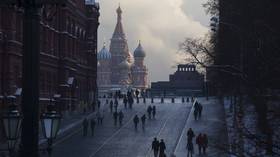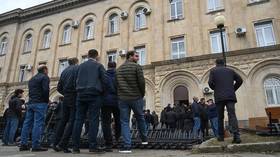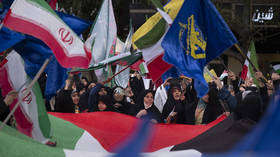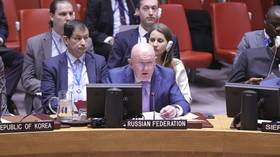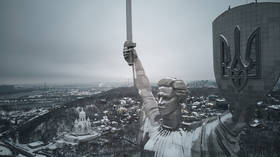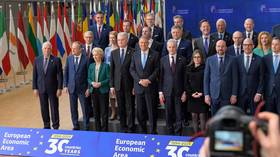ROAR: US biochemist Kornberg joins Russia’s “Silicon Valley” project

US biochemist and professor of structural biology at Stanford University School of Medicine Roger David Kornberg will co-chair the scientific and technical council of Russia’s new “Silicon Valley”.
This is “a big honor for Russia,” the first deputy head of the presidential administration Vladislav Surkov was quoted by RIA Novosti news agency as saying.
Kornberg won the Nobel Prize in Chemistry in 2006 for his studies on the process where genetic information from DNA is copied to RNA, “the molecular basis of eukaryotic transcription.”
In 1959, at the age of 12, he attended a ceremony where his father, Arthur Kornberg, was awarded the Nobel Prize in Physiology or Medicine.
Roger Kornberg’s research lies at a junction of chemistry, genetics, and biology, and one of the directions of modernizing the Russian economy is the development of biomedical technologies, Surkov noted, explaining the decision to invite the scientist to Russia.
He added that Kornberg’s candidacy was proposed by Russian scientist Zhores Alferov, who won the Nobel Prize in Physics in 2000. He will head the scientific council overseeing the Skolkovo project alongside foreign specialists.
Skolkovo will be a hub for the development and commercialization of new technologies, President Dmitry Medvedev said in March. The main areas of research and production will be energy, IT, telecommunications, biomedicine and nuclear technologies. The whole project will be coordinated by tycoon Viktor Vekselberg.
Russia will be inviting more foreign specialists to take part in developing the innovations center. “I think Kornberg's opinion will determine to a great extent the strategic line of the project,” Surkov noted.
“The organizers of Russia’s ‘Silicon Valley’ have decided from the beginning that this will be an innovative city, and the best specialists from around the world will come here,” Rossiyskaya Gazeta said in the article called “the Nobel tandem”.
According to Surkov, at least two or four Nobel laureates will live here. And Kornberg’s participation is considered the first step in the process of attracting outstanding foreign scientists to the project.
The first meeting of the scientific and technical council will take place in autumn to determine the main directions of the innovative center’s work. The members of the council will be selected by Alferov, Kornberg and Vekselberg.
Kornberg may be very useful in organizational and scientific parts of the work, many observers believe. He was the first to answer the question “how hereditary information is transcribed,” said Elena Shematorova of Institute of' Bioorganic Chemistry of the Russian Academy of Sciences.
“A body should copy the information that is preserved in its genes to use it,” the scientist told the paper. The invention of the US scientist is very important for medicine, she added.
The fact that Kornberg is a Nobel laureate speaks for itself, believes Vladimir Gvozdev, head of the department of the Institute of Molecular Genetics and an academician of the Russian Academy of Sciences.
Kornberg has found out “the structure of a very big protein that synthesizes ribonucleic acid,” Gvozdev told Vzglyad online newspaper. He was awarded “for studying the process of transcribing information from DNA to RNA,” he said. This research is connected with medicine, he said.
As for Skolkovo, Gvozdev said he was “rather skeptical” about the project. “The science that should be supported does not receive enough financing,” he stressed. The budget of the program “Molecular Cellular Biology” in which “the best Russian scientists” participate, was cut this year," Gvozdev noted. “It is not billions, but a fairly modest sum,” he said. However, he wished the best for the Skolkovo project.
Alferov was appointed thanks to his ties with other Nobel Prize winners, Izvestia daily said. “No one Russian scientist has such weight in the world scientific elite as communist Zhores Alferov,” the paper noted in the article headlined “Nobel Alley”.
“As the Skolkovo project is extremely ambitious, and financing for its creation is huge, Alferov’s co-chair had to be selected from scientists at the number one level,” the daily said.
The Russian leadership can be congratulated with the appointment of Kornberg because it is difficult to find another scientist with such authority and ties in the world, Corresponding Member of the Russian Academy of Sciences Sergey Kochetkov told Izvestia daily.
Some in the scientific community doubt that Western leading scientists may come to Skolkovo, Kochetkov said, adding that now this skepticism has been refuted.
Generations of biochemists are using the textbook written by Kornberg’s father, he said. “His son has brought biosynthesis of proteins to particular mechanisms of reading genetic information, lifting biochemistry at the engineering level,” the scientist noted. “Kornberg’s father was engaged in phenomenological description, and Kornberg’s son has built a molecular machine,” he added.
If Kornberg seriously works in Skolkovo, he will be very useful and “he may attract a group of new persons who will bring a new style to our science,” Kochetkov told Vesti FM radio.
Another scientist, Konstantin Severinov, told Izvestia that apart from scientific talents, Kornberg is “an excellent manager” who may spend funds effectively.
However, whatever enthusiasm Kornberg may have in the Skolkovo project, it should be understood that “the main area of his scientific ambitions is tightly linked to America,” the paper noted
The main part of the Skolkovo innovations center with a modern infrastructure will be built in seven years. Kornberg will be a co-chair of the scientific board to help Alferov, but general manager Vekselberg will also get a foreign workmate. This specialist is expected to be familiar with the global economy and have authority in the scientific and technical community.
Sergey Borisov,
Russian Opinion and Analysis Review




